College News

Serena Bemmo Kamdem, who was born in Cameroon, moved to the U.S. Virgin Islands at the age of 7. Relocating was tough, and her new school suggested ESL classes to avoid being held back a grade. But her dad, a middle school math teacher, created workbooks to help Kamdem and her three siblings learn English […]

Christopher R. Boyer has been named the founding dean of the College of Humanities & Earth and Social Sciences at UNC Charlotte following a national search. His appointment was approved during the April 25 meeting of the University’s Board of Trustees. Boyer will join UNC Charlotte effective July 1 from Northern Arizona University, where he currently holds […]

The Department of Geography and Earth Sciences was renamed the Department of Earth, Environmental and Geographical Sciences, effective April 9. This name change more accurately represents the collaborative approach within the department, said John Smail, interim dean of the College of Humanities & Earth and Social Sciences. “We are excited that this new name reflects the […]
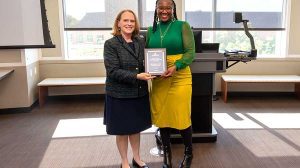
Kendra Jason, associate professor of sociology, is this year’s recipient of the Bonnie E. Cone Early-Career Professorship in Teaching, which is awarded annually to a faculty member who has earned tenure within the last three years and who has demonstrated a commitment to teaching at the beginning of their academic career. Jason aims to create […]
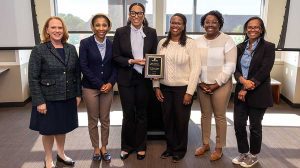
The Office of Academic Affairs recognized faculty for exemplary work in the areas of teaching, advising and civic engagement at the annual Provost’s Awards Reception held Monday, April 22. Sharon Watson, assistant professor of anthropology, is this year’s recipient of the James H. Woodward Faculty Research Award, which is given annually to an untenured member […]
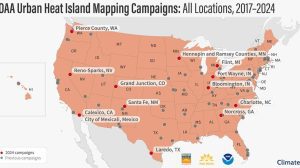
This summer, the Charlotte Heat Mappers, a coalition of community organizations, nonprofits and government entities led by UNC Charlotte’s Department of Earth, Environmental and Geographical Sciences, will oversee a community science campaign to map variations in urban heat across the city. Charlotte is one of 14 U.S. communities and four international cities selected by the […]
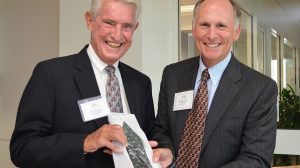
On March 27, the namesake of the UNC Charlotte Master of Public Administration Program, Gerald “Jerry” Fox, died at the age of 91. Fox was Mecklenburg County manager from 1980 to 2000; after retiring, he joined the MPA program as a part-time faculty member. Later, Fox was a founding member of the UNC Charlotte Practitioner Advisory […]
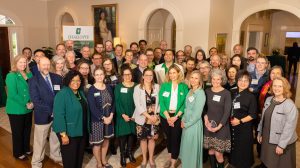
UNC Charlotte is committed to celebrating success in many different forms, and is establishing and expanding the various ways we recognize faculty. Alongside teaching excellence, exemplary research and notable publications, they have recently established recognition for large research grant funding. On Wednesday, March 27, “Charlotte’s Million Dollar Research Circle” reception recognized faculty who have received a large grant totalling at least […]
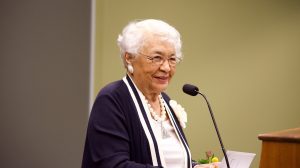
Bertha Maxwell-Roddey, Ph.D., founding director of the University’s Africana Studies Department, died March 20 at the age of 93. Maxwell-Roddey joined UNC Charlotte’s College of Human Development (now Cato College of Education) in 1970. The educational pioneer was among the first Black principals to lead a white elementary school in Charlotte. The next year, she was […]
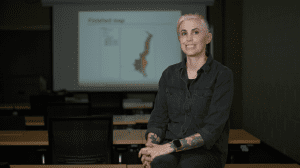
Shannon Reid, Ph.D., associate professor of Criminal Justice and Criminology and affiliate faculty with the School of Data Science, works at the intersection of technology and public safety with projects that focus on reducing crime, while increasing community buy-in and trust in AI. She serves as chief executive officer of Chimeras, which got its start from an NSF […]

Mckenna Zelna, an earth and environmental sciences major, has been nominated for the national Goldwater Scholarship. She is one of two Honors College juniors that have been nominated for the 2024 Barry Goldwater Scholarship, considered one of the top awards for undergraduate U.S. STEM students. The scholarship helps identify the next generation of leaders in scientific, mathematical […]

Two UNC Charlotte students have been announced as national finalists for the 2024 Truman Scholarship. Sonia Birla and Grace Cooper, both juniors from Cary and members of the Honors College, have advanced to the regional interview round in Washington, D.C., and are among 191 finalists selected from 709 applications nationwide. Charlotte is the only UNC System […]